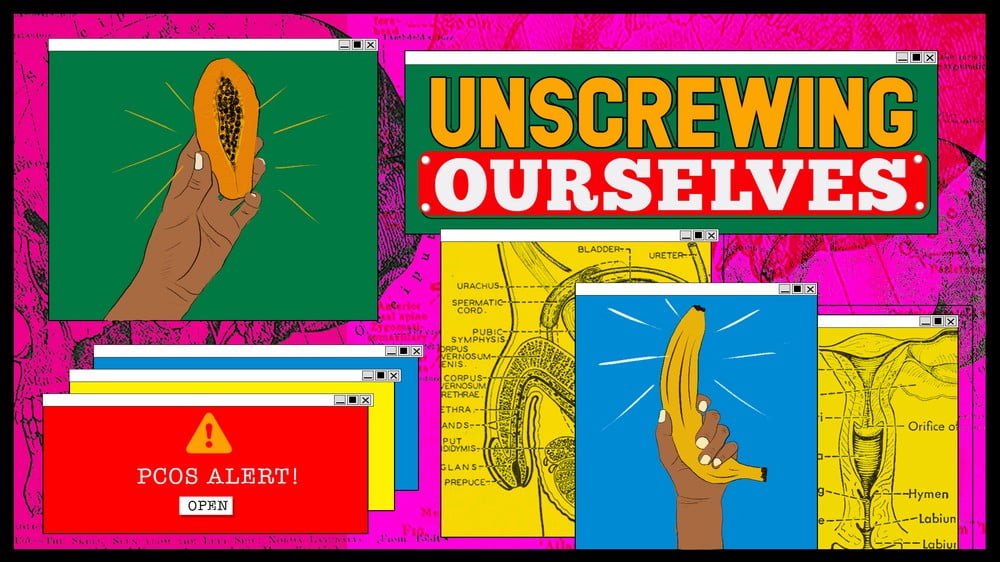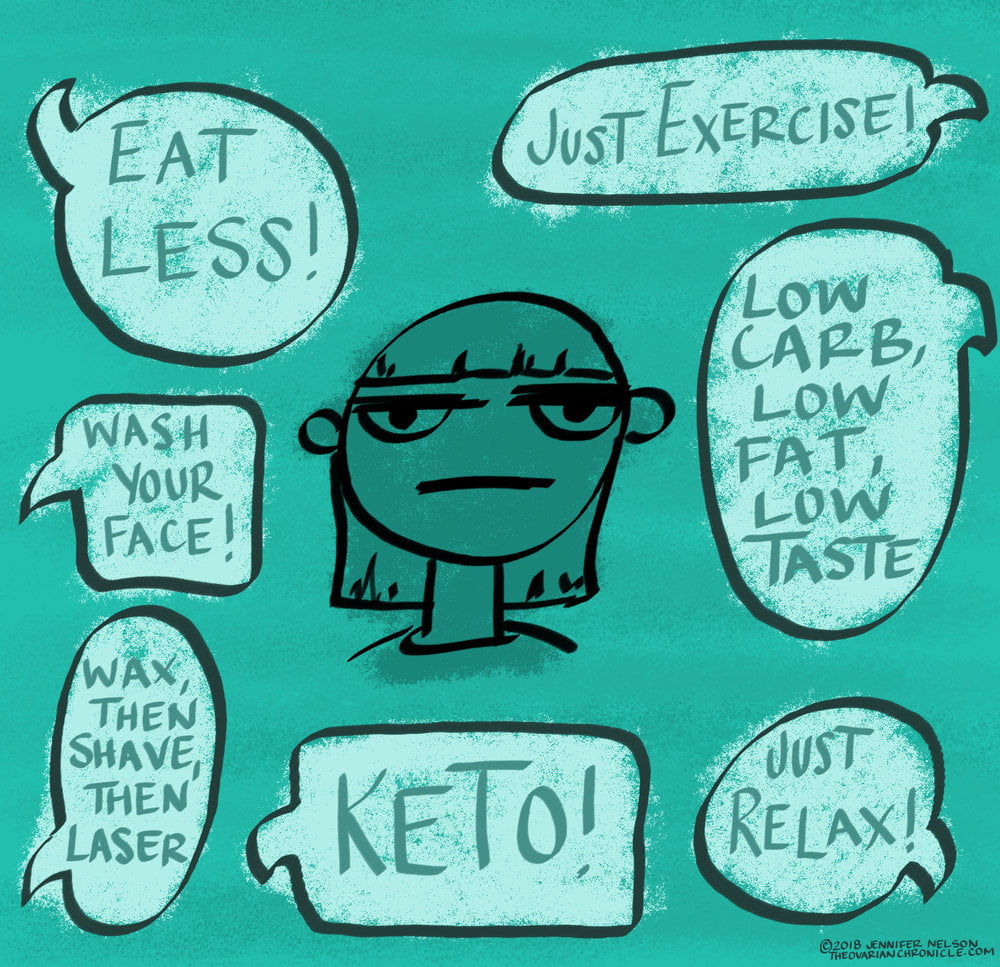Editor’s Note: This month, that is May 2020, FII’s #MoodOfTheMonth is Menstrual Health, where we invite various articles about various experiences that revolve around menstruation or the absence of the same. If you’d like to share your article, email us at pragya@feminisminindia.com.
Polycystic ovary syndrome (PCOS) is a hormonal disorder which is very common amongst women. At least one in ten women are supposed to be affected by it worldwide, and an estimated one in five are affected in India. (20%). While the exact causes are not known, the factors resulting in PCOS are attributed to genetics, production of excessive androgen in the body, insulin resistance and low grade inflammation. It then manifests both on a physical and mental level, causing irregular or extremely painful periods, hirsutism (increased hair growth), acne, depression and heightened levels of stress. In addition, women with PCOS have also been known to suffer from eating disorders, decreased sexual satisfaction, mood swings, hair loss, memory loss and sudden weight changes.
However, the way people with PCOS are treated and stigmatised especially in the Indian context, is a deeply unsettling and relevant issue to talk about at the intersection of gender and health. The healthcare system works within a patriarchal framework, where doctors, especially gynaecologists are touted to be the guardians of the family. They have to make sure that babies are coming into this world and caste-purity is being maintained through the institutions of family. They do this by treating women with PCOS not as patients with a serious health syndrome but as vessels who will be future mothers, and in order to be future mothers, their femininity and sexuality (in the most heteronormative standards) has to be preserved.
Throughout history, medical science has always been an androcentric discipline, with very little representation from women, trans and non-binary people. Thus, it is not surprising to see how the research for PCOS is so inadequate and poor, in addition to being highly heteronormative. Till date, doctors do not know the exact cause of PCOS, which leads to them addressing only the symptoms of PCOS, without being able to get to the root of it.
Throughout history, medical science has always been an androcentric discipline, with very little representation from women, trans and non-binary people. Thus, it is not surprising to see how the research for PCOS is so inadequate and poor, in addition to being highly heteronormative. Till date, doctors do not know the exact cause of PCOS, which leads to them addressing only the symptoms of PCOS, without being able to get to the root of it. Symptomatic treatment for PCOS has mainly focused on weight reduction, unrealistic diets, birth control pills, methods to prevent infertility etc.

Sanjana, who has a history of PCOS shares,
“I started gaining weight when I was 11. I have a history of being constantly body shamed for however short and fat I looked. I constantly found myself going on fad diets, trying to half-wear my bra to let my breasts look smaller or tying a scarf over my bra to flatten my chests. I gave up on those only when I developed extreme sort of scars on my breasts. All of this translated to body image issues, stress and low self-esteem. I started developing symptoms of PCOS very early on but because menstruation was already a taboo around the place where I was growing up – I chose to not bring that up. I was diagnosed with PCOS only when I entered college. The first doctor I went to warned me of only one consequence of PCOS – infertility. The second doctor I tried asked me to lose weight to fight PCOS. The third doctor I consulted asked me to work out twice a day in addition to other physical activities. The fourth doctor put me under medication that wouldn’t stop me from crying for about a month. There is so much emphasis being given to my body being able to reproduce and also to lose weight that even the consequences that doctors warn of reflect the patriarchal gaze. This is one of the major reasons why diagnosis of PCOS often happens very late.”
Women suffering from PCOS also, in almost all cases have varying degrees of anxiety and depression. It is a chronic illness which affects all aspects of one’s life. Constantly being mocked about one’s weight, the lack of support and awareness around this, being blamed for bringing PCOS upon oneself all add to the stress and low-self esteem issues. They are also termed ‘lazy’ or ‘irresponsible’ for not being able to follow a diet/exercise routine to reduce the adverse effects of hormonal imbalances that come along with PCOS. Menstruation, already being a taboo in our society, prevents a lot of young women from finding support within family for the same unless it concerns fertility issues.
Ashmita, who has been experiencing symptoms of PCOS since she was 11 says, “I can’t share the pain or the mood swings I deal with in my family because no one wants to talk about periods. I started my treatment of PCOS because my family took me to a doctor to get my acne marks treated (for better marriage prospects in the future) and then the doctor told them that to cure the marks permanently I would have to go through PCOS treatment. She also believes that the treatment is necessary so that I can get pregnant easily.”
Women suffering from PCOS also, in almost all cases have varying degrees of anxiety and depression. It is a chronic illness which affects all aspects of one’s life. Constantly being mocked about one’s weight, the lack of support and awareness around this, being blamed for bringing PCOS upon oneself all add to the stress and low-self esteem issues. They are also termed ‘lazy’ or ‘irresponsible’ for not being able to follow a diet/exercise routine to reduce the adverse effects of hormonal imbalances that come along with PCOS.
Thus, dealing with PCOS is feeling the inadequacy of both body image and body function. Body image issues stem from how society wants us to conform to feminine standards of beauty (sans hair and the added weight). But there is also the extreme frustration felt at how a body with PCOS isn’t able to function the way we think it should – irregular and painful menstruation, eating disorders, lack of ability to be able to do physically strenuous work, constant digestive and stomach issues resulting in horrible cramps – all of these combining to worsen one’s mental health.
Also read: PCOS And Women: What We Need To Know
Jaanvi, who has suffered from PCOS since she was 12 says, “People constantly kept telling me what I needed to eat, how much, and what exercises to do. In a year, I lost weight, but I had also developed bulimia, an eating disorder. My mother tried to get me to eat less fats, tried the hard love way, it only made things worse. I experienced a lot of body shaming in that particular year, especially due to the sudden weight and acne.

The absolute lack of control one feels over their body and mind while dealing with PCOS is inexplicable. This is important to understand why ‘control’ based methods to deal with PCOS are so reductive. Controlling one’s diet and regularly exercising are not the only things someone with PCOS needs. (Next time you meet someone with PCOS, please don’t tell them to eat healthy or go to the gym. They probably know that).
It’s high time that the medical community stops allocating all its resources and time only towards cis-men’s health. What is needed, is more extensive and multi-dimensional research into the syndrome. More advocacy to make mental and sexual health services accessible to all. More sensitivity from doctors who don’t see a woman’s health only in relation to her reproductive capacity. More intersectional medical approaches that include and address the health concerns of transgender people. More support from communities to fight fatphobia and cope with depression.
Also read: What People Don’t Tell You About Stretch Marks And PCOS
Lastly, it’s essential to develop a common understanding that every single body is different. PCOS is not to be blamed on the person suffering from it for they did not cause it. What they should be getting is our support and empathy, Not our patronization, infantilization or pity.
References
- How a Flawed Understanding of PCOS Robs Women of Their ‘Femininity’
- PCOS Therapist (Elizabeth Armstrong)
Featured Image Source: PCOS Awareness Association
About the author(s)
Imperfect Feminist and Literature Student. Raging to build a kinder world.





This is by far the best piece write up I have ever come across, nice work Astha
always learning from Astha, very well written GREAT JOB!
Great Job!! This is so well written, always learning a lot from Astha